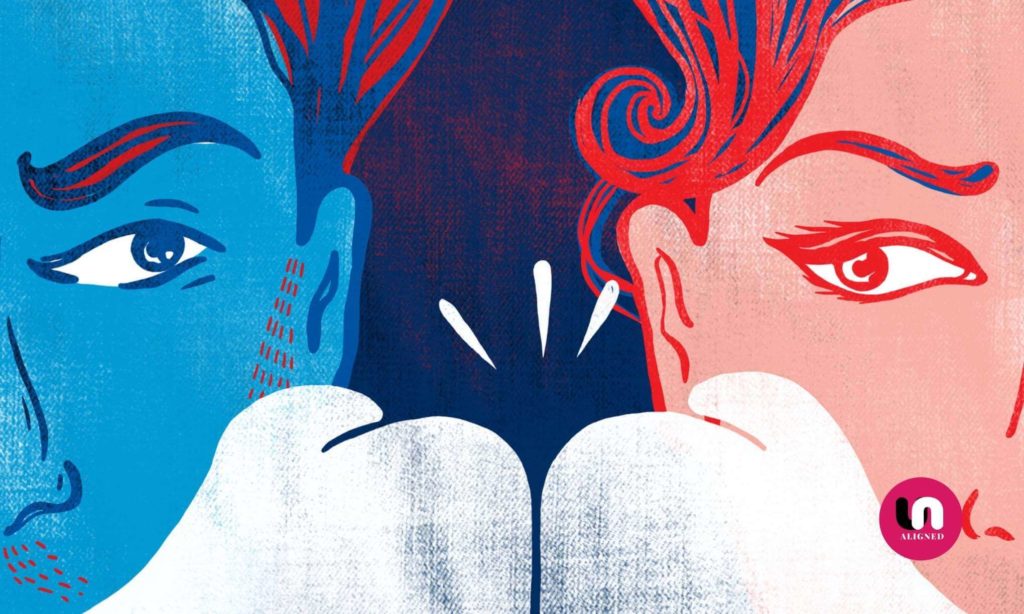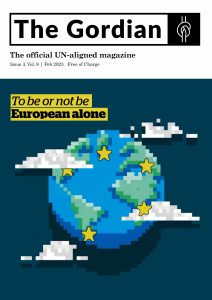Imagine visiting your mother or father in their home. When you arrive, you discover that they are in distress in front of the television. They look at you with fear in their eyes; you look at them and then to the ordinary television screen, not understanding the problem. Your mother or father imagines that the people on the television are home intruders, and they ask you how those people got into the house.
This scenario played out for Noor and her mother in London in 2017, they had moved from North Africa to the UK together in the 1970s.
Back in her hometown, Noor’s mother- a vivacious, vibrant and fiercely independent lady, ran a successful kitchen in a centre for visually impaired people. With a taste for adventure, she took charge of the family’s decisions including the move from a remote African village with her young family to the metropolis of London. Here she worked as a chef serving Arabic cuisine. She worked in restaurants on the glossy streets of Knightsbridge and Edgware Road, London.
Now the same lady stood in front of Noor, agitated and without the mental capacity to organise her own thoughts into actions.
Could it really just be forgetfulness in her mature age and a general disorientation, or was something more insidious going on? Noor’s mother was never confined by society’s expectations of women at that time. She would pack her seven children into a van to travel around their home country in the summertime. “If you want something, you get it for yourself.” That was her motto. However, this vivacious spirit had become a confused shadow of her former self.
“It’s Dementia” the doctor confirmed.
Now all the instances of forgotten handbags and nonsensical questions had an explanation. But the sense of despair in coming to terms with her mothers incurable condition was just the start. A Dementia diagnosis was the catalyst that eroded and eventually destroyed the family unit, all of which Noor now understands was preventable. Noor wishes to share her story as a warning to other families.
It’s not unusual for children to care for their parents in old age. Noor was taken aback that in a time when one might assume a group of seven siblings would join together, instead all seven siblings fell victim to their own mother’s lack of planning.
The changes happened fast and all at the same time
When Noor’s mother received her diagnosis, she was living independently. Her condition had deteriorated but she was deemed to be of sound mind enough to make her own decisions. After the diagnosis, a Lasting Power of Attorney (LPA) was drawn up. This is a legal document that let Noor’s mother appoint two of her children to make decisions on her behalf for when she would lack the mental capacity to do so. However, the unappointed siblings contested the LPA.
The LPA which had outlined some of Noor’s mother’s wishes was relinquished in 2018. Moreover, by then she had also lost most of her ability to make her own decisions. Settling on a suitable care plan, therefore, became an issue. A void opened owing to everybody’s own interpretation of what would be best. There were so many points to consider, such as where she should stay, in which country and with whom; as well as how to fund her care. Tensions arose and a bitter battle became a breeding ground for the worst aspects of human nature. Conversations about welfare became a tangled mess with money often at the root of it. A war waged on, precious time together was lost.
Noor’s mother has, by all accounts, had a successful life. She understood the meaning of hard work and had built up an estate in her 50 years in the UK. She likely believed that she had prepared herself for old age. She had assets to cushion her into retirement and could enjoy her resources to grow old gracefully. However, the reality was different. Without the correct documents to protect their mother in place, money and deeds had disappeared following the diagnosis. Time that could have been spent being close to their mother and cherishing the good moments was spent engaging in malicious legal feuds over her estate.
Noor took the reins to become her mother’s carer. Although her brothers supported Noor, she did not have the full support of her whole family.
Noor was in the messy middle of watching her outgoing mothers mentality change into that of around a 3 year old without much warning.
With the help of specialists, Noor was beginning to understand her mother’s condition better. She did still have memories but largely sensory, piqued by familiar music, sights and smells from her early childhood. She still had a desire to be busy, outside, and doing something, but without the ability to coherently follow through because of the confusion in her mind. Since their mother’s only memories were from her early childhood in North Africa, the cold and grey streets of London increasingly upset her even further.
Her language reverted back to the dialect and accent she would have spoken in her hometown when growing up.
Noor and her brother organised a brief respite for their mother in her home country last year, hoping that she would feel more at ease. What should have been a short break has stretched into 2021 as Noor’s other siblings were eager to have their mother in their care too. Noor is not content with the sporadic shuffling of her mother between siblings and refers to it more like a football being kicked from pillar to post. But without an LPA to solidify their mother’s wishes, all her health, care and financial decisions were open to the individual speculation of her seven children.
Each family has its own politics and siblings have their own role to play. One might consider themselves the mediator, the leader, or the hot-headed one, but sadly, in times of crisis our flaws can be heightened and any negative dynamics in the family intensified.
Noor is still picking up the pieces from the diagnosis of her mother four years later, and getting back to herself after caring for her mother, and coming to terms with the fact that she will not be able to have a coherent one-to-one conversation with her mother ever again. In 2017 nobody in her family spoke about Dementia or really knew what it was, let alone consider making provisions in case it would happen to their parents. Previously Noor had thought that she’d rely on her family, culture and religion for protection in the hard times but those expectations had dissolved in the face of a crisis.
No matter how successful Noor’s mother may have been and how cherished and special she is to her children, Noor has agonised over the fact that her mother’s brilliant life has amounted to a sad final chapter of her story, with her children still locked in a stalemate about their mothers care and finances, rather than honouring who she was and who she had become by creating new memories while there was still time.
Plan before it’s too late
Following the disagreements that have shaken the family, Noor urges us all to have that conversation with our elderly parents to protect them, and our adult children to protect us.
Planning for one’s old age is paramount for us all since any of us can potentially become incapacitated.
The wishes regarding a person’s care and finances should be crystallised in a legal document as soon as possible and while of sound mind. In the UK this is done via an LPA in addition to a Will, and these should be written before any diagnosis may or may not occur. Putting these measures in place while we are well ensures that our wishes will be respected, met, and carried out by those we choose and without interference. To have such a conversation after a diagnosis could be too late, and creates space for disagreements.
Noor’s mum was a very powerful woman- her power ironically became most evident after diagnosis, since the matriarch of the family was no longer there to maintain order and keep everyone in line. The saddest thing for Noor is that her brothers and sisters were never given the chance to grieve the rapid loss of their mother’s mind, and the loss of her entire inhibitions, the family did not pull together to celebrate their mother’s life, nor did they get the chance to grieve the loss before her cognitive dissonance. The changes happened fast and all at the same time. It was without warning and difficult to take seriously. Had her documents been in order, they could continue their time together now honouring their mother’s wishes collectively.
For privacy reasons the author of this piece has chosen to use a pseudonym for Noor’s real name.




















